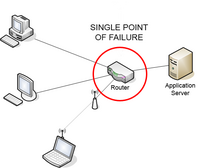
Photo from wikipedia
Abstract The gas pipeline network is an essential infrastructure for a smart city. It provides a much-needed energy source; however, it poses a significant risk to the community. Effective risk… Click to show full abstract
Abstract The gas pipeline network is an essential infrastructure for a smart city. It provides a much-needed energy source; however, it poses a significant risk to the community. Effective risk management assists in maintaining the operational safety of the network. The risk management of the network requires reliable dynamic failure probability analysis. This paper proposes a methodology of condition monitoring and dynamic failure probability analysis of urban gas pipeline network. The methodology begins with identifying key design and operational factors responsible for pipeline failure. Subsequently, a causation-based failure model is developed as the Bowtie model. The Bowtie model is transformed into a Bayesian network, which is analyzed using operational data. The key contributory factors of accident causation are monitored. The monitored data is used to analyze the updated failure probability of the network. The gas pipeline network's dynamic failure probability is combined with the potential consequences to assess the risk. The application of the approach is demonstrated in a section of the urban gas pipeline.
Journal Title: Journal of Loss Prevention in The Process Industries
Year Published: 2021
Link to full text (if available)
Share on Social Media: Sign Up to like & get
recommendations!